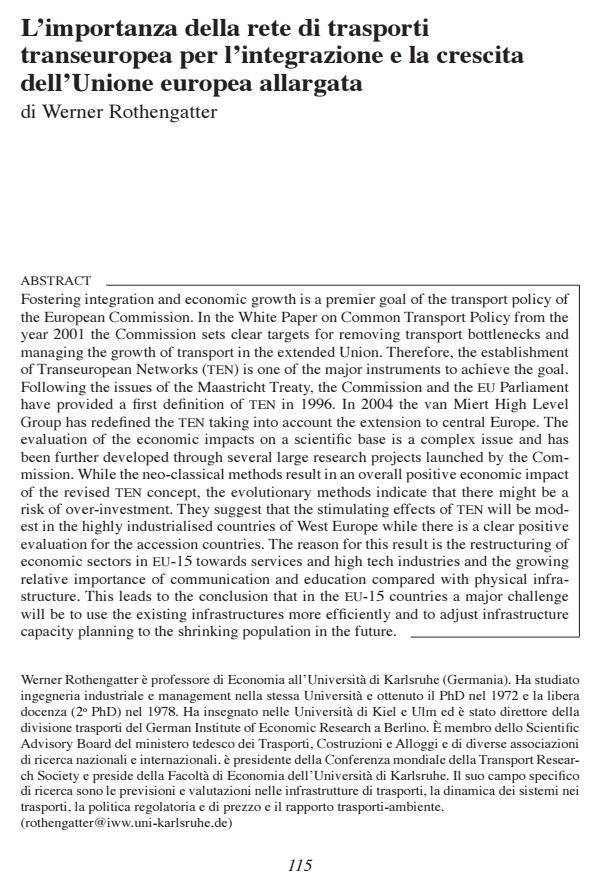L'importanza della rete di trasporti transeuropea per l'integrazione e la crescita dell'Unione europea allargata
Titolo Rivista ECONOMIA PUBBLICA
Autori/Curatori Werner Rothengatter
Anno di pubblicazione 2005 Fascicolo 2005/4 Lingua Italiano
Numero pagine 18 P. Dimensione file 1552 KB
DOI
Il DOI è il codice a barre della proprietà intellettuale: per saperne di più
clicca qui
Qui sotto puoi vedere in anteprima la prima pagina di questo articolo.
Se questo articolo ti interessa, lo puoi acquistare (e scaricare in formato pdf) seguendo le facili indicazioni per acquistare il download credit. Acquista Download Credits per scaricare questo Articolo in formato PDF

FrancoAngeli è membro della Publishers International Linking Association, Inc (PILA)associazione indipendente e non profit per facilitare (attraverso i servizi tecnologici implementati da CrossRef.org) l’accesso degli studiosi ai contenuti digitali nelle pubblicazioni professionali e scientifiche
Fostering integration and economic growth is a premier goal of the transport policy of the European Commission. In the White Paper on Common Transport Policy from the year 2001 the Commission sets clear targets for removing transport bottlenecks and managing the growth of transport in the extended Union. Therefore, the establishment of Transeuropean Networks (TEN) is one of the major instruments to achieve the goal. Following the issues of the Maastricht Treaty, the Commission and the EU Parliament have provided a first definition of TEN in 1996. In 2004 the van Miert High Level Group has redefined the TEN taking into account the extension to central Europe. The evaluation of the economic impacts on a scientific base is a complex issue and has been further developed through several large research projects launched by the Commission. While the neo-classical methods result in an overall positive economic impact of the revised TEN concept, the evolutionary methods indicate that there might be a risk of over-investment. They suggest that the stimulating effects of TEN will be modest in the highly industrialised countries of West Europe while there is a clear positive evaluation for the accession countries. The reason for this result is the restructuring of economic sectors in EU-15 towards services and high tech industries and the growing relative importance of communication and education compared with physical infrastructure. This leads to the conclusion that in the EU-15 countries a major challenge will be to use the existing infrastructures more efficiently and to adjust infrastructure capacity planning to the shrinking population in the future.;
Werner Rothengatter, L'importanza della rete di trasporti transeuropea per l'integrazione e la crescita dell'Unione europea allargata in "ECONOMIA PUBBLICA " 4/2005, pp , DOI: